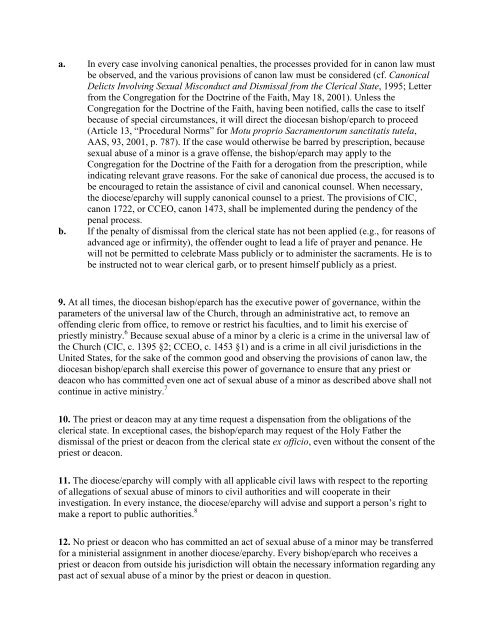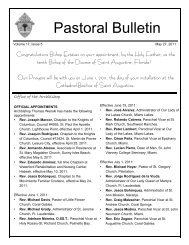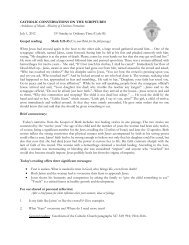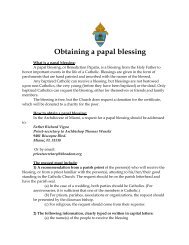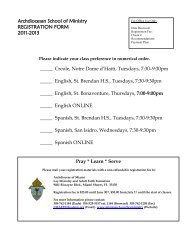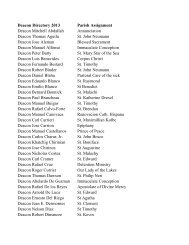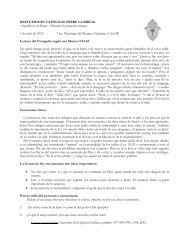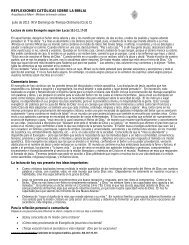Charter for the Protection of Children and Young People - USCCB.org
Charter for the Protection of Children and Young People - USCCB.org
Charter for the Protection of Children and Young People - USCCB.org
You also want an ePaper? Increase the reach of your titles
YUMPU automatically turns print PDFs into web optimized ePapers that Google loves.
a. In every case involving canonical penalties, <strong>the</strong> processes provided <strong>for</strong> in canon law must<br />
be observed, <strong>and</strong> <strong>the</strong> various provisions <strong>of</strong> canon law must be considered (cf. Canonical<br />
Delicts Involving Sexual Misconduct <strong>and</strong> Dismissal from <strong>the</strong> Clerical State, 1995; Letter<br />
from <strong>the</strong> Congregation <strong>for</strong> <strong>the</strong> Doctrine <strong>of</strong> <strong>the</strong> Faith, May 18, 2001). Unless <strong>the</strong><br />
Congregation <strong>for</strong> <strong>the</strong> Doctrine <strong>of</strong> <strong>the</strong> Faith, having been notified, calls <strong>the</strong> case to itself<br />
because <strong>of</strong> special circumstances, it will direct <strong>the</strong> diocesan bishop/eparch to proceed<br />
(Article 13, “Procedural Norms” <strong>for</strong> Motu proprio Sacramentorum sanctitatis tutela,<br />
AAS, 93, 2001, p. 787). If <strong>the</strong> case would o<strong>the</strong>rwise be barred by prescription, because<br />
sexual abuse <strong>of</strong> a minor is a grave <strong>of</strong>fense, <strong>the</strong> bishop/eparch may apply to <strong>the</strong><br />
Congregation <strong>for</strong> <strong>the</strong> Doctrine <strong>of</strong> <strong>the</strong> Faith <strong>for</strong> a derogation from <strong>the</strong> prescription, while<br />
indicating relevant grave reasons. For <strong>the</strong> sake <strong>of</strong> canonical due process, <strong>the</strong> accused is to<br />
be encouraged to retain <strong>the</strong> assistance <strong>of</strong> civil <strong>and</strong> canonical counsel. When necessary,<br />
<strong>the</strong> diocese/eparchy will supply canonical counsel to a priest. The provisions <strong>of</strong> CIC,<br />
canon 1722, or CCEO, canon 1473, shall be implemented during <strong>the</strong> pendency <strong>of</strong> <strong>the</strong><br />
penal process.<br />
b. If <strong>the</strong> penalty <strong>of</strong> dismissal from <strong>the</strong> clerical state has not been applied (e.g., <strong>for</strong> reasons <strong>of</strong><br />
advanced age or infirmity), <strong>the</strong> <strong>of</strong>fender ought to lead a life <strong>of</strong> prayer <strong>and</strong> penance. He<br />
will not be permitted to celebrate Mass publicly or to administer <strong>the</strong> sacraments. He is to<br />
be instructed not to wear clerical garb, or to present himself publicly as a priest.<br />
9. At all times, <strong>the</strong> diocesan bishop/eparch has <strong>the</strong> executive power <strong>of</strong> governance, within <strong>the</strong><br />
parameters <strong>of</strong> <strong>the</strong> universal law <strong>of</strong> <strong>the</strong> Church, through an administrative act, to remove an<br />
<strong>of</strong>fending cleric from <strong>of</strong>fice, to remove or restrict his faculties, <strong>and</strong> to limit his exercise <strong>of</strong><br />
priestly ministry. 6 Because sexual abuse <strong>of</strong> a minor by a cleric is a crime in <strong>the</strong> universal law <strong>of</strong><br />
<strong>the</strong> Church (CIC, c. 1395 §2; CCEO, c. 1453 §1) <strong>and</strong> is a crime in all civil jurisdictions in <strong>the</strong><br />
United States, <strong>for</strong> <strong>the</strong> sake <strong>of</strong> <strong>the</strong> common good <strong>and</strong> observing <strong>the</strong> provisions <strong>of</strong> canon law, <strong>the</strong><br />
diocesan bishop/eparch shall exercise this power <strong>of</strong> governance to ensure that any priest or<br />
deacon who has committed even one act <strong>of</strong> sexual abuse <strong>of</strong> a minor as described above shall not<br />
continue in active ministry. 7<br />
10. The priest or deacon may at any time request a dispensation from <strong>the</strong> obligations <strong>of</strong> <strong>the</strong><br />
clerical state. In exceptional cases, <strong>the</strong> bishop/eparch may request <strong>of</strong> <strong>the</strong> Holy Fa<strong>the</strong>r <strong>the</strong><br />
dismissal <strong>of</strong> <strong>the</strong> priest or deacon from <strong>the</strong> clerical state ex <strong>of</strong>ficio, even without <strong>the</strong> consent <strong>of</strong> <strong>the</strong><br />
priest or deacon.<br />
11. The diocese/eparchy will comply with all applicable civil laws with respect to <strong>the</strong> reporting<br />
<strong>of</strong> allegations <strong>of</strong> sexual abuse <strong>of</strong> minors to civil authorities <strong>and</strong> will cooperate in <strong>the</strong>ir<br />
investigation. In every instance, <strong>the</strong> diocese/eparchy will advise <strong>and</strong> support a person’s right to<br />
make a report to public authorities. 8<br />
12. No priest or deacon who has committed an act <strong>of</strong> sexual abuse <strong>of</strong> a minor may be transferred<br />
<strong>for</strong> a ministerial assignment in ano<strong>the</strong>r diocese/eparchy. Every bishop/eparch who receives a<br />
priest or deacon from outside his jurisdiction will obtain <strong>the</strong> necessary in<strong>for</strong>mation regarding any<br />
past act <strong>of</strong> sexual abuse <strong>of</strong> a minor by <strong>the</strong> priest or deacon in question.


